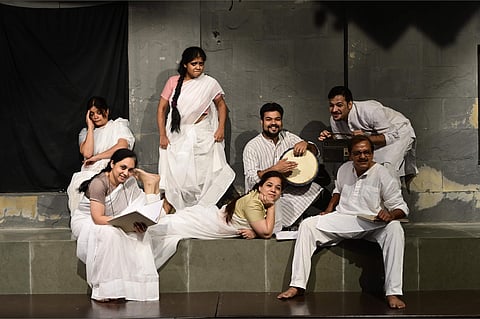
- LIFESTYLE
- FASHION
- FOOD
- ENTERTAINMENT
- EVENTS
- CULTURE
- VIDEOS
- WEB STORIES
- GALLERIES
- GADGETS
- CAR & BIKE
- SOCIETY
- TRAVEL
- NORTH EAST
- INDULGE CONNECT

It’s been exactly 50 years since Shyamanand Jalan established Padatik Theatre in Kolkata along with his wife Chetana Jalan with hopes to resurrect the art of theatre in Kolkata. His vision is being carried on till date by the flag bearers of the group, despite multiple obstacles on its way such as the two-year long pandemic. A space for free thinkers, where every idea no matter how bizarre it might be is given importance, Padatik is now delving deep into the works of some famous writers from India and abroad like Ismat Chughtai and Mark Twain, apart from original productions mainly written by Vinay Sharma, artistic director, writer, and actor of the group. We speak to Vinay to learn more about techniques they are exploring these days and upcoming productions.
How would you differentiate Padatik Theatre from other troupes of the city?
We have a theatre space and an infrastructure which has always allowed us to treat it like a theatre lab where it’s not about following any rigid theatrical rules with a specific agenda. Padatik Theatre has come a long way since it was established in 1972. The culture here has always been eclectic and this has been carried on ever since. There is a lot of freedom of thought that has always been bestowed upon the directors which then permeates through the actors who we are working with. I particularly do not believe in creating an army of actors who function in the same way. The freedom of thought helps the air flow through our minds at Padatik.
Are you experimenting with any alternative techniques at Padatik?
Recently I started a project called Theatre and Jeans, which cannot exactly be defined in terms of its meaning but its concept only. Here, we are trying to work on productions specifically with young actors where a grand design isn’t of prime importance. The labels of realism, naturalism, absurdism or third theatre cannot be applied here as the idea is to expose the actors to texts in a way where the text becomes predominant. The director doesn’t bother about the cinematography in this form as well, since it can be organically evolved as and when it happens. Limitations such as funding is not a matter of concern here and it is all about the actor’s body and mind being exposed to more ideas.
What sort of spaces are you focussing at the moment?
We are hardly exploring the proscenium stage at all, any more. We restrict our performances initially when we are working on it to Padatik Little Theatre itself, which is our own studio theatre space that accommodates around 50 or 70 people at a go depending on the type of performance. If a production involves floor arrangements such as our recent one Kaagaz ke Gubbare based on Ismat Chughtai’s works encourage modifying the layout of seats which can go up or down accordingly. We rarely venture out within the city to perform at any other auditorium; however we try to take it outstations to places like Prithvi Theatre at least once a year. Our approach is more of an Indie theatre approach, just like Indie films.
What’s next?
In January itself we will be doing a production oriented workshop where we will audition actors and select a small group and a play depending on the number of participants and then train them around the production. It is more of a hands-on training, with no fixed curriculum. We also try to be very open to out station groups that are coming in and would like to perform at Padatik Theatre just like a group called Sutradhar will be coming down from Hyderabad next month. We also keep doing a lot of theatre screenings and will soon be hosting Prof. Ananda Lal to conduct a course on the history of theatre courses. I have also started working in a new production called Version 1.2 which is a dystopian farce that looks into the future where all the nations are ruled by just one autocratic, invisible leader.